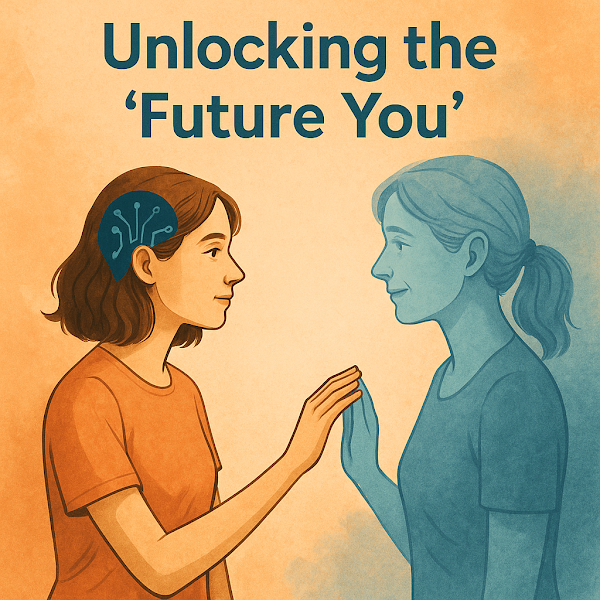Today, a groundbreaking study unveiled “Mirai”—an AI-powered wearable that uses your own voice to gently nudge you toward healthier habits in real time—and another project, “Future You,” lets you have a conversation with an AI-generated version of your future self, reducing anxiety and boosting long-term motivation. These aren’t sci-fi—they're here now.
So what's new? Unlike old habit apps, these tools adapt to you, constantly. Mirai sees your environment, decides you might skip a water break, and whispers in your cloned voice: "Remember that hydration goal?" — almost like a friend reminding you. "Future You" simulates the future you, letting you ask your older self for guidance, increasing what's called future self-continuity—that emotional bridge between who you are now and who you'll become. Studies show this lowers anxiety and strengthens long-term goals (e.g., career persistence).
Let’s humanize the tech: You’ve felt the guilt of skipping workouts, missing deadlines, not calling Mom. Now imagine a gentle prompt that sounds like you, encouraging you at the moment, not in a robotic tone. That’s the power behind Emotional Self-Voice nudging: it’s you talking to you in a supportive tone, and it's been shown to raise resilience, motivation, and even confidence more than text alone.
At the same time, we’re not just becoming efficient carbon machines. The rise of microefficiencies—small life-hacks like prepping tea or leaving shoes by the door—might seem trivial, but they free mental space. Just like journaling gratitude or going for a short walk, these small wins build upward spirals of well-being, especially when paired with bigger intentions.
And there’s real science behind it. Mindfulness-based programs like MBSR (Mindfulness-Based Stress Reduction) are proven to shrink your stress and boost brain connectivity; one study shows benefits lasting up to three years. Meanwhile, digital mindfulness tools are reducing anxiety and improving sleep—80% of users report positive effects after using them remotely.
Here’s how this connects to you:
- You’re juggling goals—fitness, clarity, emotional health. These tools help you align small daily actions with long-term dreams.
- You care about meaning, not just muscle. AI nudges are compassionate, non-judgmental reminders shaped by you, aimed to help—not shame.
- You're tired of apps flooding you with notifications. This tech only steps in when it matters, reducing noise and boosting focus.
Let’s break down two fancy terms:
Future self-continuity: that warm feeling when your current self feels connected to the future you—like hearing your future self saying “you can do this.” It’s linked to better planning, less impulsivity, and greater calm.
Metacognitive learning: a smart system’s ability to monitor its own thinking—like knowing when to pause or change tactics. Mirai and Future You blend this with human reflection to create real, lasting behavior change.
So why should you care now?
Because this isn’t about hitting a productivity target or hacking your brain—it’s about scaffolding your growth. It’s about gentle guidance, self-trust, and long-term transformation—not fleeting hype.
Your journey isn’t broken; it’s human. And now, tools are emerging that support, not shame you—tools that speak in your voice and echo your future ambitions.
Start small—maybe ask your future self what dinner to choose tonight. Or try a single AI voice prompt today. Notice the ripple.
Your future self isn’t a distant dream—it’s a conversation away.

Comments
Post a Comment